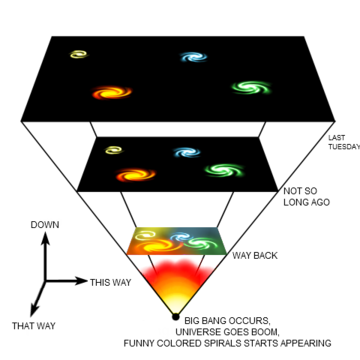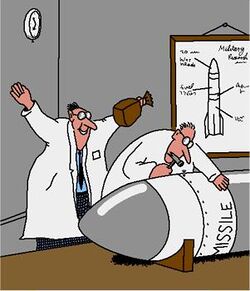Big Bang
The Big Bang Theory is a theory about a bang that was big. The theory posits that the Big Bang was so enormously, hugely, stupendously big that it created the universe, but an alternative theory has shown that this is not, in fact, the case. Scientist and bicycle repairman Humphrey Bimpt has shown, through his famous equation E=MC Hammer2, that the actual primogenitor of the universe was the Small Bang, and that the Big Bang was just God showing off.[1]
Childhood[edit]
The Big Bang before its burst was a subatomic particle; the Big-Bangonium. It had the properties of a monoquark, but didn't have any friends, so it exploded in order for its guts to become visceral friends. Before it was a Big-Bangonium, it was an old dying universe that shrunk due to osteoporosis.
The Aftermath[edit]
The Big Bang was actually a nuke and wiped out the remaining populations of the already critically endangered dinosaurs of the land before time. Needless to say, the world was shocked by this pronouncement, and Monsignor Georges Henri Joseph Édouard Lemaître was consequently hanged as a result of the Cristero War currently occuring in Mexico, which many think was directly linked to Monsignor Georges Henri Joseph Édouard Lemaître theory, even though it doesn't fit the chronological order of things. These people are believed to be snorting crack. This really pissed off Captain Kirk so he put a cap in his ass.
Nevertheless, Monsignor Georges Henri Joseph Édouard Lemaître's work was carried on by Edwin Hubble, who discovered that galaxies are moving away from each other at an increasing rate, which means that sometime in the past they must have all been together. Edwin Hubble later stated that the Hubble-Humason constant of 500 km/s/Mpc, which led many to believe that Edwin Hubble was a victim of mathematiks, the evil scientist version of mathematics.
Criticism[edit]
Sir Fred "Hoyle" Flintstone strongly opposed this theory during his entire life, proposing that the Milky Way was never caused by the Big Bang. Instead, the universe would be in a Tantric or Steady State, in which the coitus had not yet come to an end, creating the Milky Way.
In his essay Treatise on Stuff, Descartes opposed the Bing Bang theory and called it a misunderstanding. He claimed that the concept of the Big Bang originated from the Latin Big Bong, which explains the existence of the Universe as an illusion of the mind after an experience with a Big Bong. Thus, when we talk about the Bong as a Bang we simply immerse the mind (of the individual self) to a realm of deeper understanding. Therefore, in Descartes' own words: Cogito Ergo Sum (Eng.: "Congenital Argot Some").
Spring theory proposes that when cosmic springs coil into another dimension the result is a big boing.
Some Mongolian scientists believe that the big bang is the result of the war in Iraq. They claim to have evidence that Saddam Hussein blasted his weapons of mass destruction into space, to hide them from inspectors for the UN (unique nitwits). According to Mongolian simulations of the various launches, the rockets should have collided some 40 billion kilometers to the left of the fabulous land of the elves where they exploded and bent the space-time magic marker. Unfortunately no other scientist wants to confirm this theory, because the rest of the world is ignoring Mongolia since they declared war against the gypsies.
In 2006, Karl Pilkington proposed that the big bang may have not been so very big, but just sounded louder "because there was not a lot of noise to drown it out."
Several other theories have been proposed as well, including the Small Bang Theory, the Moderately-sized Bang Theory, the Just-big-enough Bang Theory, the Large Whimper Theory, the Chitty-Chitty-Bang Bang Theory, the "One-a-Bang, Two-a-Bang, Three-a-Bang, Boom" Theory, the "I was Drunk" Bang, the "Horrendous Space Kablooie" and the Box-office-flop Bang Theory, which states that the big bang was a cause of the dump that the girls from Two Girls, One Cup made, all of which had more scientific merit than the Big Bang Theory but due to decreasing popularity in science (despite Popular Science magazines), the Big Bang Theory became the norm partially due to its relative simplicity (everything blew up...) and partially because the movie version would be more likely to attract male teens in the lucrative 19-25 demographic. Even though the movie version was eventually scrapped (most likely due to the negative reaction films received when they left out subplots in scientific theories), scientists stayed by their initial claim due to both their stubbornness and their unwillingness to be a flip-flopper.
The Burrito Theory[edit]
One night, the Father, the Son and the Holy Ghost got so high they had an idea to microwave a burrito so big and hot the three of them could not eat it. The burrito theory purports it was this burrito that caused the big bang.
The Vanessa Feltz Theory[edit]
A group of scientists studying British Television have formulated a new theory that Vanessa Feltz is in fact immortal.
The theory is that over time Vanessa Feltz ingests an increasing proportion of the Universe, becoming larger and larger with eventually her internal gravity forming a Black Hole which grows progressively feeding on other Black Holes, after a point increasing exponentially during a period known as The Big Crunch which continues until all matter is absorbed. The single Black Hole collapses under its own weight and pressure is forced out with a supermassive explosion as the entire old universe is expelled. Later, it is time for tea and biscuits and maybe a prime time show and the process repeats.
Space Nous Theory[edit]
According to this theory, everything that exists and occurs on our universe has existed or occurred already billions of years ago in the universal noggin of the Space Nous as mere ideas (including the four fundamental interactions). Then the Nous entered a Buddhist enlightenment, realizing that there would be much needless suffering if the universe consisted of impermanent forms of matter and consciousness that are ever changing (evolving). So the Spirit of the Space Nous brooded over what the universe should be like, then through the Space Logos, light came into existence. Then through the Logos, everything that was already planned and simulated for millions of years in the Space Nous was basically "transferred" over to what would become our universe.
The Daltonian Cosmotheory (they've many other theories in many scientific fields)[edit]
- Averell: When a universe becomes old, does it become sparse and cold?
- Joe: Well that's the average set of conditions.
- Averell: What do you mean by that? Is there more to it?
- Joe: After many trillions of years, if a hypothetical astronaut selects any universal region he wishes, that region will be more sparse and colder than the average nowadays conditions are.
- Averell: I don't get it! So why there is more to it?
- Joe: Imagine you're not a human sized astronaut; instead you're universally large, as big as a galactic hypercluster!
- Averell: Piece of cake! I feel extremely tall inside some carriages. I begin to get it I guess. Please continue!
- Joe: That extremely old universe, will expand way faster than the nowadays universal state. That will be felt at any scale, but mostly at the humongous scope. That won't last for long. Gradually even smaller breadths, will expand faster and faster, until the expansion becomes to affect the pointwise scale in a destructively creative way, so then enormous amounts of matter will pop into existence; We call that event the Big Bang!
- Averell: I think you're wrong. I believe that even nowadays a negligible excess of particles do come into existence, and that will increase logarithmically; so the Big Bang is permanent, but exhibits logarithmic burps.
- Joe: Well... You might be right. Morons speak faster than their thoughts, so sometimes their words aren't affected by their stupid brain... but that happens rarely. Enough for today! Go to bed!
See also[edit]
References[edit]
- ↑ Humphrey Bimpt (3200). The Small Bang Theory and How to Fix Your Bike (extra value edition). Chicken Chow Mein Books Ltd.


